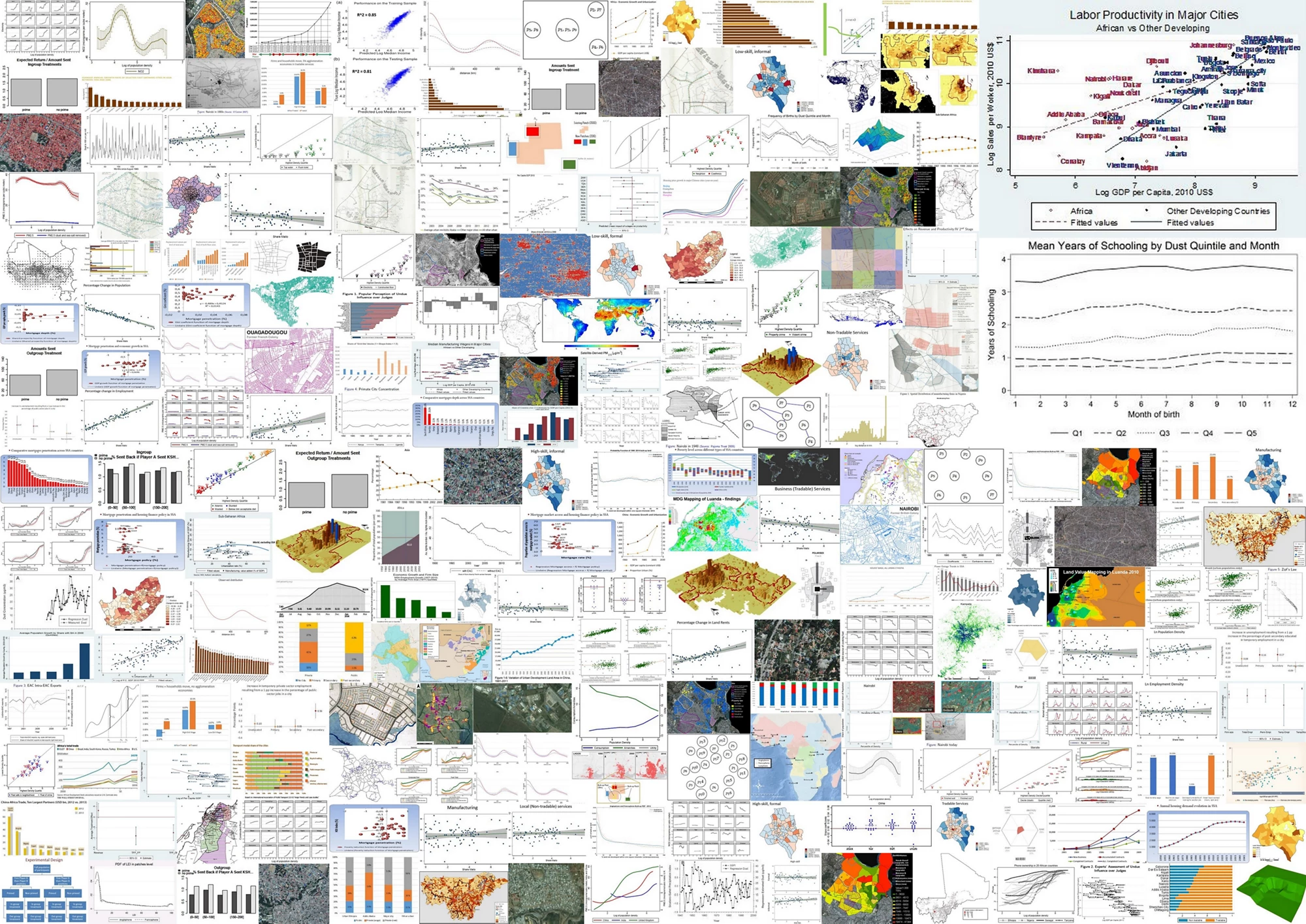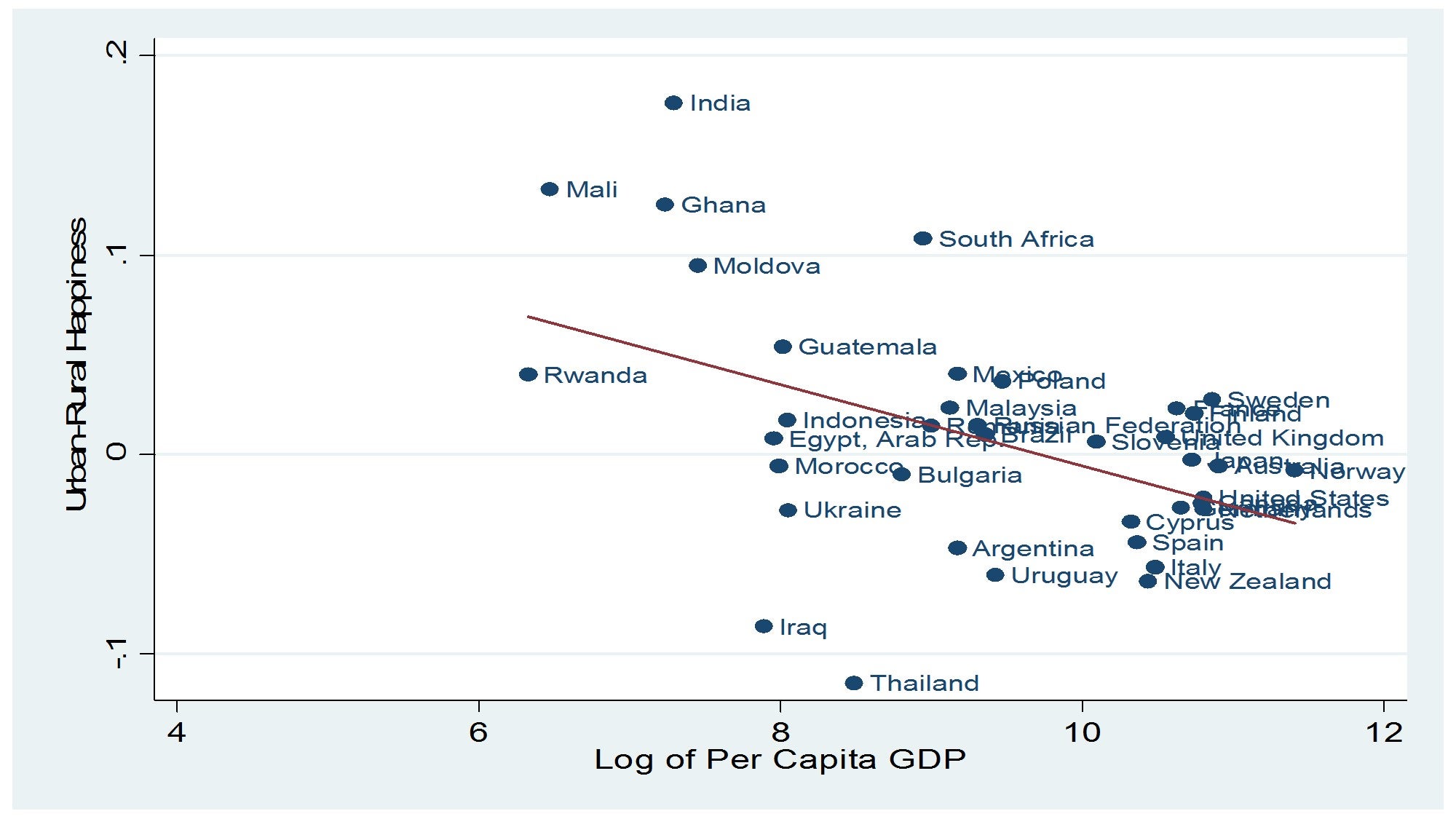
Here is a quick run-down of the ideas presented. We didn’t see every paper, so if you presented your work and it isn’t listed here, please add it in the comments.
In opening remarks, Makhtar Diop (World Bank Vice President for Africa) highlighted both the demographic implications of African cities, with fertility falling more slowly than in other urban areas, and the need for strengthened tax systems to fund the services that cities need ( watchable here, starting at 10:07). In the keynote speech, Ed Glaeser from Harvard’s economics department walked us through “The Good and Bad of Cities” ( watchable here, starting at 27:43). He taught that African cities can learn more from Latin America’s cities than from China’s, which urbanized very differently; that Google Street View allows a particularly rich measure of urban characteristics in the U.S., but preliminary work in Jakarta suggests lower accuracy (jury is still out on whether it’s usable); and how to deal with the trifecta of density downsides: public management failures (poorly executed projects), political failures (poorly selected projects), and legal failures (unsafe private property). He ended with the stylized fact that in poor countries, people report significantly higher happiness in cities. (This difference drops to zero in rich countries.)

With that in mind, to the research!
Infrastructure, services, markets and well-being
- Power outages across 15 countries in Africa adversely affect productivity, including by leading to smaller, less energy dependent firms (Mensah) IV, Diff-in-diff.
- Using a dataset of “825 million individuals in rural India” (!!), “road construction to previously unconnected villages leads to a 10 percentage point reduction in the share of households and workers in agriculture, with an equivalent increase in wage labor market participation” (Asher & Novosad) Fuzzy regression discontinuity.
- Across Africa, living standards increase almost monotonically with population density, whereas disamenities (crime, pollution) increase less consistently, providing a striking spatial disequilibrium. (Gollin, Kirchberger, & Lagakos; and Kirchberger)
- In utero exposure to “dust pollution in West Africa increases infant mortality” more than pollution in Mexico and similar to wildfires in Indonesia (Adhvaryu, Bharadwaj, Fenske, Nyshadham, & Stanley) Difference in differences. West Africa.
- Adnan Khan presented an experiment in progress (and joint work with others) in Pakistan looking at if giving people more say in local public service delivery increases their tax compliance.
- Nominal urban wages are higher in African cities. Using data from Tanzania and Uganda this does not appear to be due to sorting, and it’s no longer significant once you control for price differences, except for self-employed workers in Dar es Salaam (Bernard, Jones, D’Aoust).
- There is a wage premium of 22 to 24 percent for public sector workers in Ethiopia, and they work fewer hours, but the premium has declined over time. Higher levels of public employment are correlated with higher levels of employment (Hill & Meijia-Mantilla).
- Jobs are concentrated in downtown Kampala. Outside of the central business district, jobs are evenly dispersed, with geographically weighted regressions identifying a number of sub-centers that contribute very little to total jobs (Goswami & Lall).
- A multi-faceted RCT looked at reducing signaling problems and transport costs in Addis Ababa. Both interventions increase the likelihood of permanent employment by about 5 percentage points: Transport improved job search intensity and efficacy, the signaling intervention improved search efficacy. Results are stronger for the less educated and women (Abebe, Caria, Fafchamps, Falco, Franklin, & Quinn; and Franklin).
- Did East African regional integration (EAC) change the economic geography of cities? Yes, according to night-lights and road network analysis. Cities close the to border grew more after trade liberalization, particularly for the first four years (Eberhard-Ruiz).
- What are the effects of post-election violence on trust between ethnic groups in urban Kenya? Trust games show little evidence that people favor the same ethnic group. However, when primed to remember violence, men give less to own ethnic group than to others (Ferguson, Fiala, & Leroch).
- In African cities, slums are often adjacent to the commercial center – in contrast to rich cities, in which income drops as one extends from the commercial center. Using data from Nairobi, one can highlight the trade-offs with upgrading slums versus relocating them. (Henderson, Regan, & Venables)
- Tanzania is one-third of the way through its urbanization process. Limited connectivity (via transport networks and density) had limited agglomeration benefits to date. (Collier & Jones)
- Slum upgrading in Tanzania in the 1970s and 1980s has left persistently high numbers of roads and plots, along with higher land values. (Regan, Nigmatulina, Baruah, Rauch, & Michaels)
- “Plants which belong to manufacturing industries with similar input-output linkages or workforces tend to locate near one another. … Little evidence that plants that share similar technologies cluster geographically.” (Bougna) Canada
- Are African cities under-connected, whether because of underinvestment in transport or poor land markets? Landscan data, together with census and firm data, suggest that someone in an African city is less connected to other people within 10 kilometers, relative to other developing countries. (Henderson & Nigmatulina)
- In Côte d’Ivoire, the capital city (Abidjan) is overcrowded and has a population many times that of secondary cities. A model of diversified urbanization – i.e., strengthening secondary cities – will require planning but will yield large benefits. (Coulibaly & Fall)
- The colonial legacy appears to persist. African cities in former English colonies are spread out; former French colonies are much more compact. Regressions show 11 to 14 percent more sprawl controlling for a range of factors including geography and population growth (Baruah & Henderson).
- Better market access has a big impact on areas close to the capital (Bamako), but not so on remote areas. (Blankespoor, Meplé-Somps, Selod, Spielvogel) Fixed effects. Mali.
- Rainfall negatively affects all types of crime in South Africa. Using rainfall as an instrument, there is evidence that certain types of crime deter certain types of migration. (Mahofa, Sundaram, & Edwards)
- Positive population shocks in South African cities after apartheid lead to path dependent city growth, not agglomeration or mean reversion when estimated with an IV. But bigger shocks in more dense areas lead to some agglomeration (Parsons & Rauch).
- Spatial computable general equilibrium models can provide insight into potential impacts of alternative land tenure systems. For example, switching from mailo land in Kampala, Uganda (which allows overlapping claims) to leasehold (which gives more rights of usage and transfer) would shift employment and increase incomes. (Bernard, Bird, and Venables) CGE.
- Data from Yaoundé City in Cameroon suggest increasing costs of transport with increasing density, and that in areas with little public transit, consumers fill the supply gap with motorbike and taxi use (Bindoumou & Patrick)
- How do property rights affect the built environment of a city? Uganda’s 1998 Land Act created overlapping claims on same land. Difference-in-differences estimates suggest it led to reduced investments in permanent structures. (Collier, Jones, Haas, & Barauh)
- Across sub-Saharan Africa, the depth of mortgage markets is correlated with higher stock market capitalization, as well as being a post-conflict country (Nguena, Tchana, & Zeufack).
At the end of the conference, World Bank Chief Economist for Africa Albert Zeufack summed up a number of key areas for future research.
- More and better data on the whole range of urbanization issues, from infrastructure or property rights.
- Political economy and government capacity: How do we get to productive reforms?
- The interplay between urbanization, the demographic transition, and structural transformation
- What’s the role of secondary cities?
- Capabilities, capacity and urban investment choices – what are the right technologies, not only in terms of levels, but also the capacity to implement and maintain?
- What interventions work to effectively and efficiently increase urban connectivity?
- What works to increase housing stock, both politically and economically?
- How can we better identify and assess spatial and sectoral linkages in urban economies and the interventions that increase them?
- How can we get urban labor markets to work better?



Join the Conversation